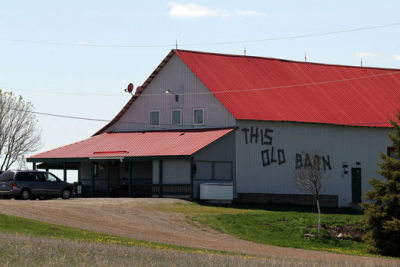People barfing because of crappy food safety don’t care if you’ve been doing things one way and never made anyone sick for millennia, dating back to your spaceship DNA founders visiting earth.
Instead, it’s, I’m barfing now because you can’t be bothered to learn something new.
Oh, and public health types: there’s a difference between E. coli and norovirus. Maybe it’s .jpg) both. Probably never happened before; figure it out.
both. Probably never happened before; figure it out.
There’s a mess of an outbreak going on in Thunder Bay, Ontario (that’s in Canada, eh?)
The district health unit is looking into the cause of an illness that struck at least 126 people who visited This Old Barn last weekend. Christopher Beveridge, manager of environmental health for the district health unit, said Thursday that norovirus was found in a stool sample from a patient admitted to hospital.
"We’re not ruling out water just yet, because norovirus can survive in a water environment," Beveridge said. "But now we’re looking at more of the food handling, as well. Where earlier in the week with the contaminated water sample we were really looking at the water system."
Earlier health unit tests found E. coli in the water.
Beveridge said the department wasn’t ruling out the possibility that both E. coli and norovirus could have been involved.
Michael Ellchook, the owner of This Old Barn, has apologized to all those who got sick. He said he has operated the restaurant for 17 years, and has never before had a problem like this.
"They found E. coli levels are a little bit high, so I’m figuring it’s got to do with the water. We had a storm on the weekend. And being a well — we have a well system — I’m thinking that’s where most of it came from," Ellchook said earlier in the day.
 A well? Is the water ever tested? Is that data available? Would you make it publicly available?
A well? Is the water ever tested? Is that data available? Would you make it publicly available?
Beveridge said 256 people ate or drank at the restaurant between May 11 and May 13. The health unit has contacted 208 of these people and is trying to reach the remainder to get information to assist in the investigation.
The health unit became aware of the situation after being contacted by emergency-room staff the Thunder Bay Regional Health Sciences Centre, where 12 people were admitted with E. coli infection symptoms.
